Top 10 Free Mental Health Apps for Virtual Support and Well-Being
Mental health affects us all. If you are feeling unwell, please seek help from a mental health professional.
Mental health apps - or shortly MHapps - are innovative mobile applications designed to provide digital tools offering app-based therapy and techniques for managing psychological well-being, catering to a wide range of issues such as stress, anxiety, and depression.
These apps are readily available for download on smartphones, tablets, and other devices, offering a convenient and accessible way to seek support for mental health challenges without the need for traditional in-person therapy. Their features are diverse, encompassing guided meditation, journaling, mood tracking, virtual therapy sessions, and even direct access to professional consultations.
With such tools at their disposal, users can take a proactive approach to their mental health, often receiving personalised insights and recommendations tailored to their specific needs.
Table of contents
- Identifying challenges when choosing the right MHapp
- Criteria for choosing the right MHapp
- 10 best free apps for mental health
- Elevating virtual mental health support with Digital Samba’s video conferencing technology
- Why choose Digital Samba for virtual mental health support?
The popularity of these apps has surged in recent years, with over 10,000 mental health apps currently available. They are frequently celebrated for their ability to provide psychological support around the clock, ensuring that help is always just a touch away. This immediacy, combined with their affordability and sense of privacy, makes mental health apps an essential resource for those who may face barriers to accessing traditional mental healthcare, such as cost, geographical limitations, or stigma.
Many of these apps are built upon evidence-based techniques like Cognitive Behavioural Therapy (CBT), offering effective strategies to manage mild to moderate symptoms of anxiety or depression. Additionally, they often include self-reflection exercises, peer-support mechanisms, and community forums that foster a sense of connection and shared experience.
Developed in response to a growing global mental health crisis, these apps aim to address the increasing demand for mental health support, particularly among younger generations. Organisations like the World Health Organization (WHO) have championed digital healthcare solutions as a means to bridge gaps in care, recognising the potential of mental health apps to transform the way support is delivered.
By combining technological innovation with psychological expertise, these apps provide an immediate, discreet, and user-friendly platform for individuals to prioritise their mental well-being. Whether used as a standalone resource or as a complement to traditional therapy, mental health apps are reshaping the landscape of mental healthcare, making it more inclusive, accessible, and empowering than ever before.
Identifying challenges when choosing the right MHapp
The journey to finding a mental health app that meets one's personal needs can be challenging. While these digital tools offer significant benefits, navigating the vast array of options to select one that is both reliable and effective requires careful consideration. Below are some challenges individuals often encounter when searching for the right mental health app:
- Finding reliable and effective virtual mental health support
Not all mental health apps are created equal, and distinguishing between trustworthy platforms and those with minimal or no evidence-based backing can be difficult. Many apps lack clinical validation or input from mental health professionals, which raises concerns about their effectiveness. For users seeking tangible improvements in their mental well-being, identifying apps that deliver measurable results through proven techniques is paramount. - Ensuring privacy and security in mental health apps
Mental health data is deeply personal and sensitive, making privacy and security a critical concern. Users often worry about how their data is stored, who has access to it, and whether it could be misused. Unfortunately, not all apps adhere to strict privacy regulations, leaving individuals vulnerable to data breaches or unethical use of their information. Selecting an app with transparent data practices and robust encryption protocols is essential to building trust and safeguarding users' mental health information. - Identifying apps with the best features for specific needs
With thousands of apps available, finding one tailored to specific mental health goals can be overwhelming. While some apps focus on mindfulness and meditation, others offer tools for mood tracking, cognitive behavioural therapy (CBT), or peer support. Users must sift through a myriad of features to determine which ones align with their unique needs, goals, and preferences. The lack of clear categorisation or guidance can make this process frustrating and time-consuming. - Enhancing accessibility and engagement in mental health care
Accessibility remains a significant barrier for many seeking mental health support. Apps may offer limited language options, fail to cater to users with disabilities or require high subscription fees that exclude a broader audience. Additionally, engagement can be a challenge—some apps are designed with clunky interfaces or lack motivating elements that encourage users to continue their mental health journey. This disconnect can lead to disuse, ultimately undermining the app’s potential benefits.
Addressing these pain points requires not only user awareness but also a commitment from app developers to prioritise quality, privacy, and inclusivity. By focusing on these aspects, MHapps can truly deliver on its promise of making mental healthcare more accessible and impactful for everyone.
Criteria for choosing the right MHapp
The growing demand for virtual mental health support underscores the importance of digital tools in addressing psychological challenges in today’s fast-paced world. Therefore, choosing the perfect mental health app requires careful consideration to ensure it aligns with personal specific needs, offers effective support, and prioritises one’s privacy. Here are the key criteria to follow:
- Clinical validation
Look for apps that are backed by evidence-based practices or developed in collaboration with mental health professionals. Check for endorsements from reputable organisations or positive clinical trial results to ensure their effectiveness. - Privacy and security
Verify the app’s data handling policies. Ensure it complies with data protection regulations like GDPR or HIPAA, has transparent privacy policies, and uses secure encryption methods to protect your sensitive information. - Personalisation
Choose an app that allows customisation based on your mental health goals. Whether it’s stress management, anxiety relief, or therapy, the app should offer tools and resources tailored to your specific needs. - Features and functionality
Review the app’s features to ensure it includes tools you find helpful, such as guided meditations, mood trackers, virtual therapy options, or peer support. The app’s usability and interface should also be intuitive and user-friendly. - Accessibility
Ensure the app is accessible, offering features like multilingual support, options for differently-abled users, and affordability. Free or low-cost apps with robust features can be especially valuable. - User reviews and ratings
Read reviews and ratings from other users to gauge their experiences. Pay attention to feedback about effectiveness, ease of use, and customer support responsiveness. - Integration with professional care
If you’re seeking therapy, choose an app that can complement or integrate with professional mental health care, such as providing access to licensed therapists or linking to medical records. - Engagement and motivation
Look for apps with gamified elements, reminders, or daily check-ins to keep you engaged and motivated in your mental health journey.
By evaluating these criteria, you can select a mental health app that not only meets your immediate needs but also provides reliable, safe, and long-term support for your well-being.
10 best free apps for mental health
Selecting the right mental health app, counselling app, or free wellness app is crucial for effective support and well-being. With mental health apps becoming a cornerstone of modern care, we present a curated list of the top 10 free apps, detailing their standout features such as guided therapy, mood tracking, and AI-driven support. These apps have proven to make a tangible impact, with users reporting reduced anxiety, improved emotional regulation, and increased mindfulness. Their value lies in offering improved access to care, catering to diverse mental health needs, and fostering enhanced patient engagement. By integrating convenience, evidence-based practices, and personalisation, these apps are revolutionising mental health care, ensuring no one has to face their journey alone.
Wysa
 Wysa is an AI-powered chatbot that provides emotional support through evidence-based techniques such as Cognitive Behavioural Therapy (CBT). It offers a range of tools, including guided meditations, mood tracking, and self-help exercises, to assist users in managing stress, anxiety, and depression. With its anonymous interaction, users can freely share their feelings without fear of judgment or privacy concerns. Wysa adapts to individual needs, making it a personalised mental health companion.
Wysa is an AI-powered chatbot that provides emotional support through evidence-based techniques such as Cognitive Behavioural Therapy (CBT). It offers a range of tools, including guided meditations, mood tracking, and self-help exercises, to assist users in managing stress, anxiety, and depression. With its anonymous interaction, users can freely share their feelings without fear of judgment or privacy concerns. Wysa adapts to individual needs, making it a personalised mental health companion.
Moodfit
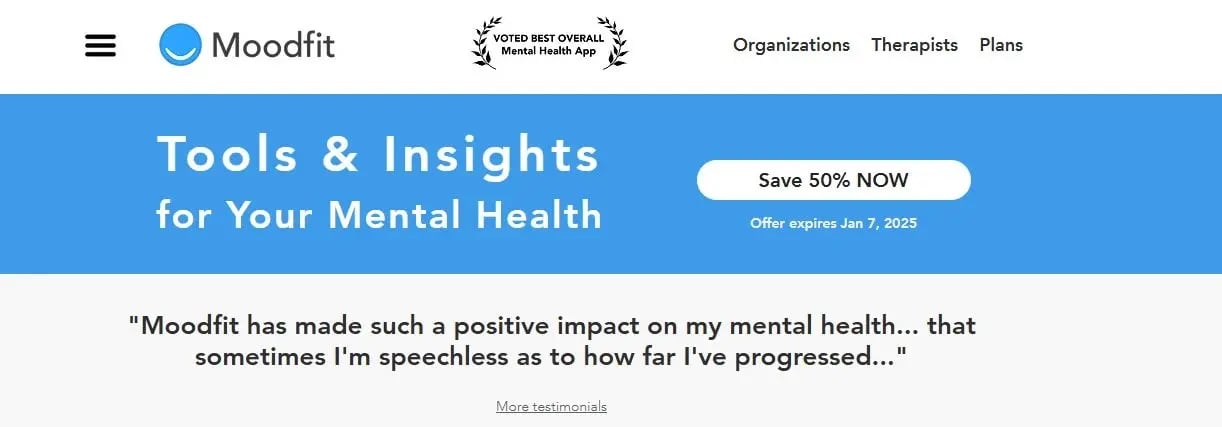
Moodfit is a versatile app designed to help users track their emotions, practice mindfulness, and engage in CBT-based exercises for emotional well-being. It allows users to set personal goals and provides insights to better understand mood patterns and triggers. The app also features breathing exercises, gratitude journaling, and mental health tips tailored to the user’s specific needs. Moodfit stands out as a comprehensive tool for building emotional resilience and self-awareness.
Insight Timer
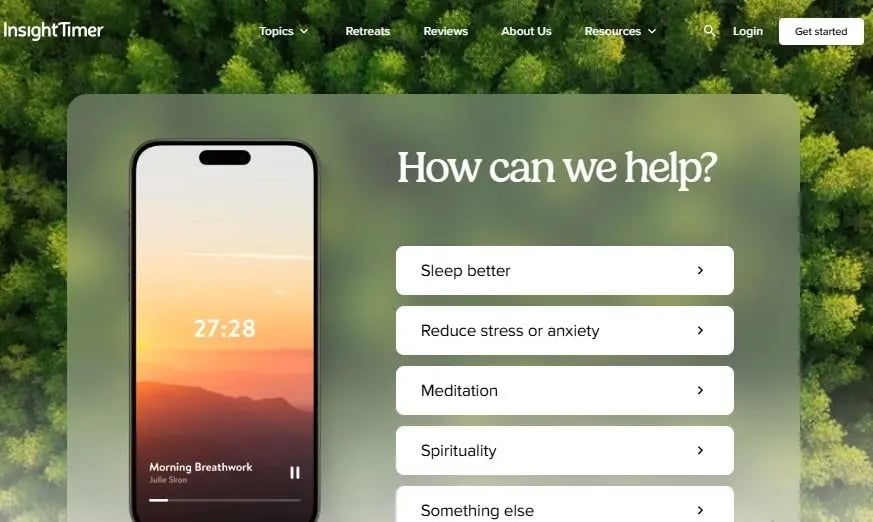
Insight Timer is a meditation and mindfulness app offering an extensive library of guided meditations, music tracks, and expert-led talks. It supports users in reducing stress, improving sleep, and cultivating emotional balance through daily practices. The app caters to a global audience with multilingual options and meditations for different levels of experience. Insight Timer also includes features like live sessions and community forums to enhance the user’s mindfulness journey.
Finch
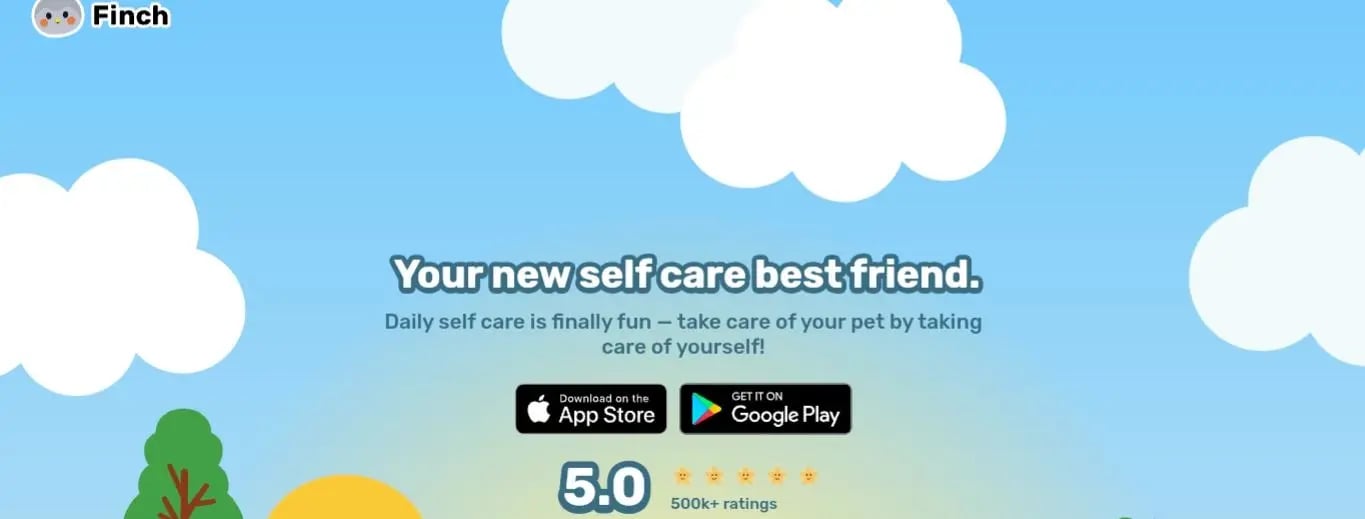
Finch is an innovative self-care app that motivates users by gamifying wellness activities with the help of a virtual pet. Users can nurture their digital pet by completing activities such as mood tracking, goal setting, and relaxation exercises. The app fosters positive habits in a fun and engaging way, appealing to users of all ages. Finch’s customisation options make it easy for users to align the app with their personal self-care goals.
Calm
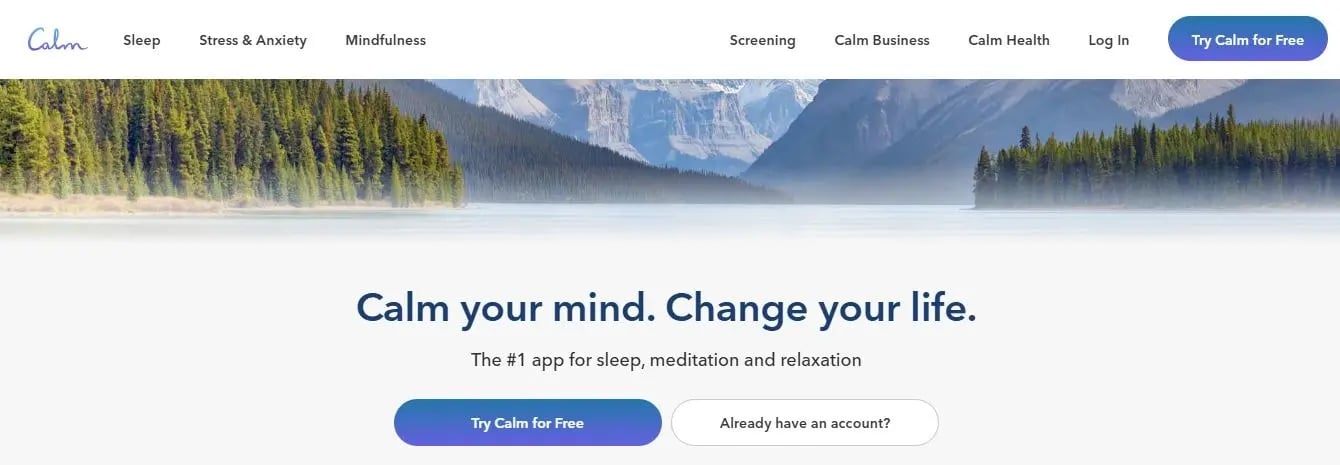
Calm is a leading app for stress relief and sleep improvement, offering guided meditations, breathing techniques, and sleep stories. It provides daily meditations and mood-boosting exercises designed to help users relax and focus. The app also features soothing music and masterclasses from mindfulness experts to deepen emotional well-being. Calm is ideal for anyone seeking to cultivate mindfulness and relaxation in their daily routines.
What’s Up?
What’s Up? combines CBT and Acceptance and Commitment Therapy (ACT) to support users in managing anxiety, depression, and stress. It features practical tools such as habit trackers, grounding exercises, and a journal for self-reflection. The app also includes a “Get Grounded” page with simple techniques to manage overwhelming thoughts or emotions. Its straightforward interface and evidence-based methods make it a valuable tool for building emotional stability.
Earkick
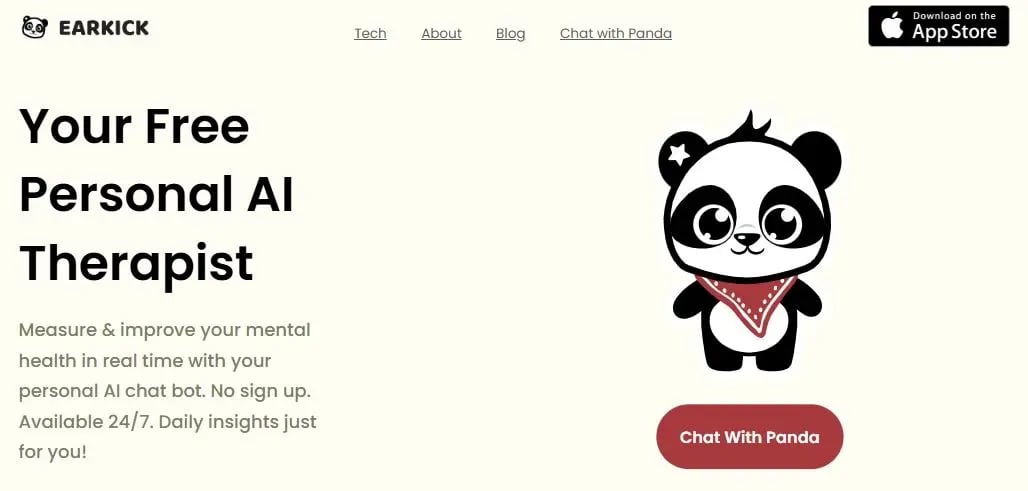
Earkick is an AI-driven mental health app that provides real-time tracking of emotional well-being and actionable insights. It uses data from the user’s daily life to offer personalised suggestions for managing stress and anxiety. The app integrates proactive guidance with practical tools like breathing exercises and mindfulness techniques. Earkick’s emphasis on real-time feedback makes it a standout choice for users seeking timely mental health support.
Happify

Happify uses science-backed activities and games to help users overcome negative thoughts, reduce stress, and build resilience. It offers guided tracks tailored to individual mental health goals, such as improving confidence or enhancing relationships. The app’s engaging design encourages users to stay consistent with their mental health practices. Happify turns self-improvement into a rewarding experience through its interactive and uplifting approach.
Youper

Youper is an AI-powered emotional health assistant that helps users monitor and improve their mental state through mood tracking and cognitive-behavioural techniques. It offers personalised suggestions, mindfulness exercises, and a journal for reflection to guide users toward better emotional health. The app’s conversational AI provides a supportive and user-friendly experience. Youper is perfect for those seeking a digital companion to help manage daily stress and emotional challenges.
7 Cups
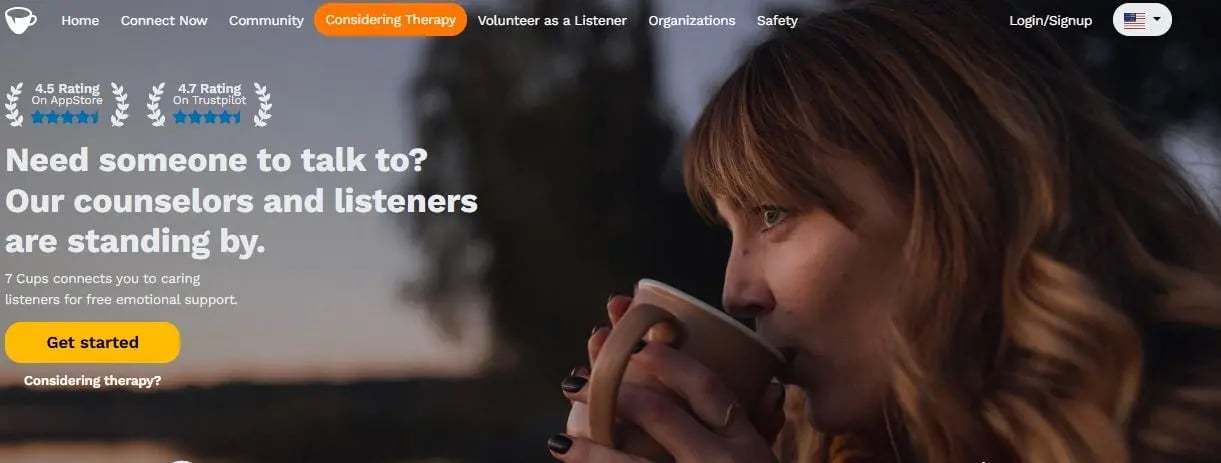
7 Cups provides free, 24/7 emotional support through anonymous chat with trained listeners and licensed therapists. It also features a community support forum where users can share their experiences and connect with others facing similar challenges. The app includes self-help guides and exercises designed to enhance emotional well-being and personal growth. 7 Cups is a safe and supportive space for anyone looking to improve their mental health and connect with a compassionate community.
Comparative table of the 10 mental health apps
|
App name |
Superlative |
Standout features |
Price |
|
Wysa |
Best for AI-driven support |
AI-driven chatbot, mood tracking, guided meditations |
Free (In-app purchases) |
|
Moodfit |
Best for mood tracking |
Comprehensive mood tracking, CBT exercises, personalisation |
Free (In-app purchases) |
|
Insight Timer |
Best for meditation |
A vast library of guided meditations, sleep aid |
Free (In-app purchases) |
|
Finch |
Best for self-care gamification |
Interactive self-care activities, virtual pet for motivation |
Free (In-app purchases) |
|
Calm |
Best for stress relief |
Meditation, sleep aid, relaxation techniques |
Free (In-app purchases) |
|
What’s Up? |
Best for CBT exercises |
CBT and ACT techniques, habit tracking, diary |
Free |
|
Earkick |
Best for real-time feedback |
Real-time mental health tracking, AI-guided suggestions |
Free |
|
Happify |
Best for resilience building |
Science-based activities and games with a resilience focus |
Free (In-app purchases) |
|
Youper |
Best for emotional health |
Mood tracking, mindfulness exercises, self-reflection journal |
Free (In-app purchases) |
|
7 Cups |
Best for emotional support |
24/7 emotional support, anonymous interactions |
Free |
These apps provide a range of features to support mental health, from mood tracking and cognitive-behavioural techniques to meditation and emotional support. Always review each app's privacy policies and ensure they align with your personal needs and preferences.
Bonus - IIWIARS
IIWIARS offers a safe, anonymous platform where users can vent their frustrations and emotional struggles without fear of judgment or exposure. Unlike typical social media or support apps, IIWIARS provides a uniquely cathartic outlet by letting users share stories as if they were on a reality show—uncensored, honest, and raw. Whether it’s relationship issues, family drama, or workplace stress, the platform fosters emotional release and connection through shared experiences. It's particularly helpful for those who find traditional therapy inaccessible or are simply looking for a way to clear their minds anonymously.
Elevating virtual mental health support with Digital Samba’s video conferencing technology
Digital Samba’s video conferencing technology is the perfect partner for mental health apps, seamlessly integrating to provide secure, high-quality virtual support. By addressing the unique demands of mental health care, this technology enhances user experience and ensures that sensitive interactions remain private and effective. Here’s how it integrates and adds value:
1. Secure communication for sensitive interactions
Mental health apps handle deeply personal conversations, making security paramount. Digital Samba’s video technology offers:
- GDPR compliance: Ensures all user data is securely stored and transmitted, meeting stringent data protection standards.
- End-to-end encryption: Protects video sessions from unauthorised access, ensuring confidentiality between users and professionals.
- Customisable permissions: Allows app developers to control access, protecting group and individual sessions with authentication mechanisms.
2. High-quality video and audio for meaningful engagement
Mental health conversations rely heavily on clear communication. Digital Samba delivers:
- HD video and crystal-clear audio: Facilitates face-to-face interaction that mimics in-person therapy, fostering trust and connection.
- Low latency: Ensures smooth, uninterrupted sessions, which is critical for users in distress.
- Adaptive streaming: Adjusts quality dynamically based on user bandwidth, ensuring reliable support for users in remote or low-connectivity areas.
3. Integration tailored for mental health apps
Digital Samba’s technology adapts to the unique needs of mental health apps with:
- Flexible API and SDK: Enables developers to embed video conferencing features seamlessly within the app, maintaining a unified user experience.
- Customisable features: Options like breakout rooms for group therapy, white-label branding, and screen-sharing for interactive sessions.
- Support for multilingual sessions: Inclusive technology for diverse user bases, ensuring effective communication across language barriers.
4. Scalable and versatile for various use cases
Digital Samba is built to meet the demands of any mental health therapy app, from small-scale therapy platforms to large-scale mental health education tools:
- One-on-one therapy: Provides secure and private virtual counselling spaces for individuals.
- Group therapy and support networks: Breakout rooms and moderator controls create structured and effective group sessions.
- Mental health workshops and webinars: High-quality video streaming for educational content delivery and engagement.
5. Enhanced engagement and accessibility
- Engagement tools: Interactive features like polls, Q&A, and real-time chat boost participation during group sessions and webinars.
- Accessibility for all: Designed for users with diverse needs, including adaptive interfaces and compatibility with assistive technologies.
Why choose Digital Samba for virtual mental health support?
Integrating Digital Samba’s video conferencing technology into mental health apps bridges the gap between users and professionals, offering reliable, secure, and accessible solutions. Whether it’s a private therapy session or a large virtual workshop, Digital Samba provides the tools to deliver impactful mental health care in the digital age.
By leveraging Digital Samba’s robust features, mental health apps can redefine how they deliver care—creating safe, high-quality virtual spaces where individuals can seek the support they need when they need it most. Contact us today to learn how our video conferencing API can be integrated into your application and adapted to your use case to enrich your offer and enhance the user experience.
SOURCES:
-
- Goodings, L., Ellis, D., Tucker, I. (2024). Introducing Mental Health Apps. In: Understanding Mental Health Apps. Palgrave Studies in Cyberpsychology. Palgrave Macmillan, Cham. Accessed on 2 January 2025
- Global strategy on digital health 2020-2025. Geneva: World Health Organization;
- 2021. Licence: CC BY-NC-SA 3.0 IGO. Accessed on 2 January 2025
- Stephan, K., A. (2024). The 8 best AI mental health companions in 2024. [Blog]. Earkick. Accessed on 1 January 2025
- John, S. (n.d.). Best free online therapy apps. Counseling Reviews. Accessed on 1 January 2025
- Moun, I. (10 December 2024). Top mental health apps: Improve your well-being. [Blog]. ZEGO Cloud. Retrieved on 2 January 2025
- Boudin, M. (11 December 2024). Best mental health apps for 2024. [Online]. Choosing Therapy. Retrieved on 1 January 2025
- Matic, A., Mandeville, A. (2 February 2023). Mental health solutions: Can ethics, accessibility, and evidence successfully coexist in digital tools? Open Access Government. Retrieved on 2 January 2025
- Gotkine, E. (2022). Mental health apps offer only basic features. [Online]. Medical Xpress. Retrieved on 2 January 2025
- Camacho E., et al (2022). Assessment of Mental Health Services Available Through Smartphone Apps. JAMA Network Open. Accessed on 1 January 2025
- Team Intellect. (9 September 2022). Mental health apps and data privacy: What you need to know. Retrieved on 1 January 2025
Share this
You May Also Like
These Related Stories
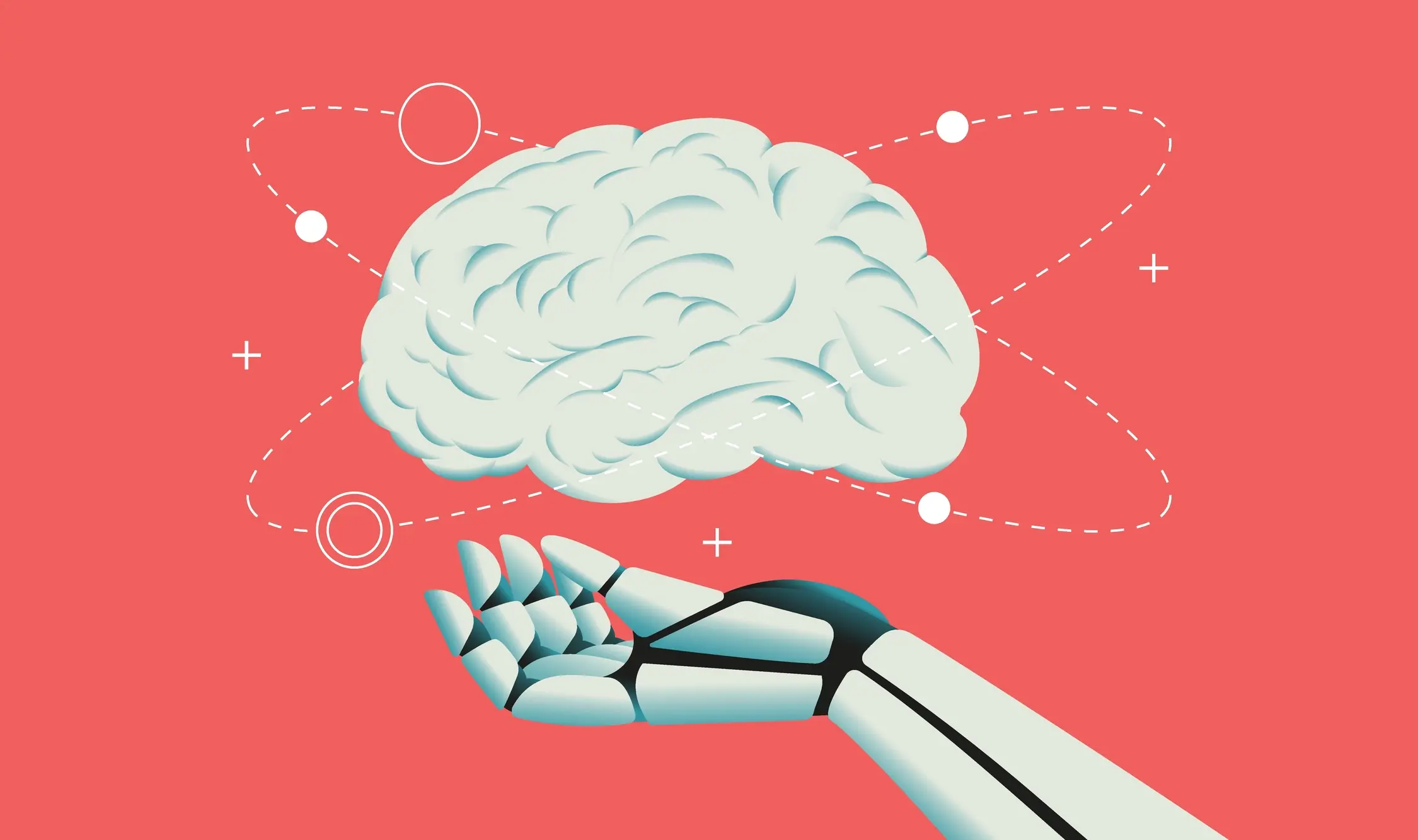
AI in Mental Health: Benefits, Uses, and Challenges Explained
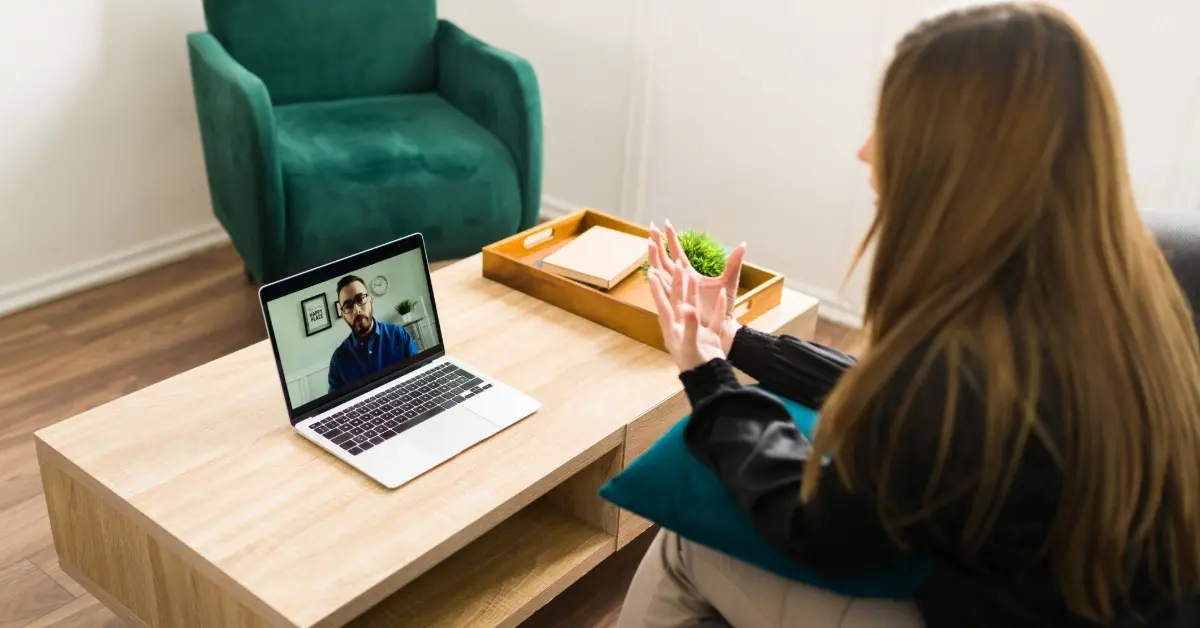
Enhancing Virtual Therapy Sessions with Video Conferencing Tools



